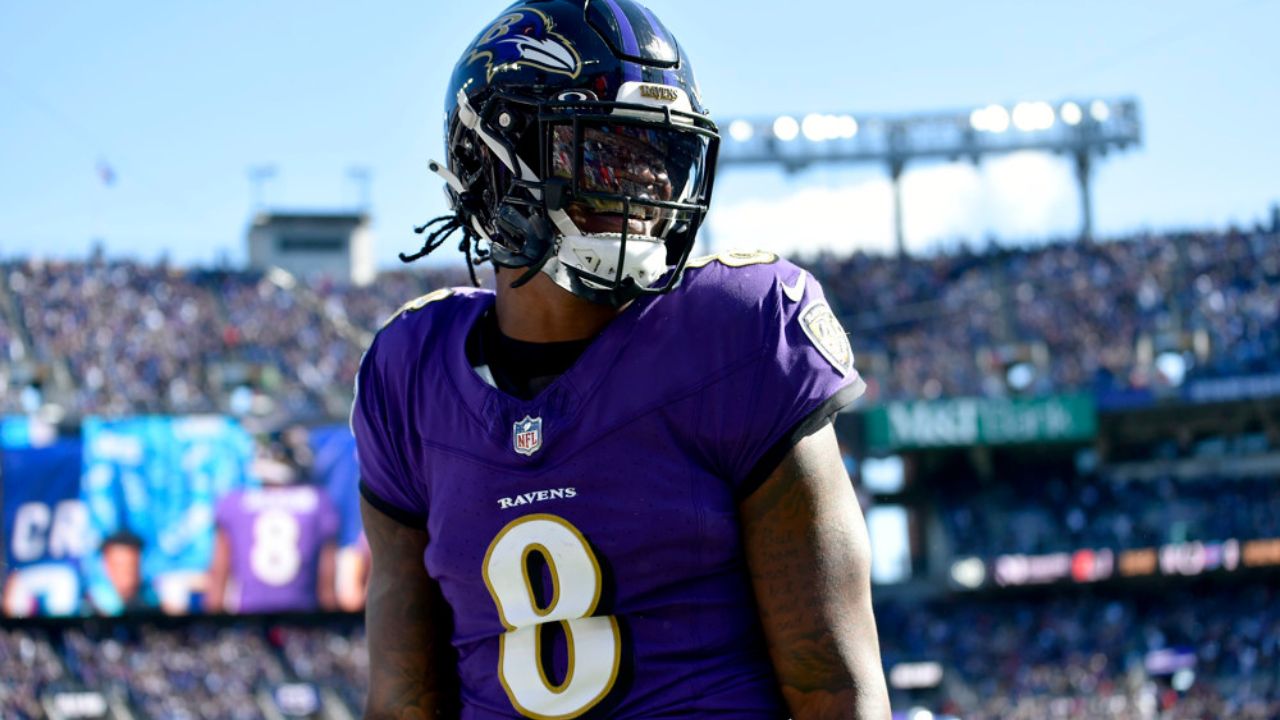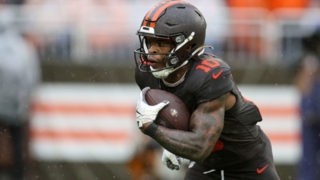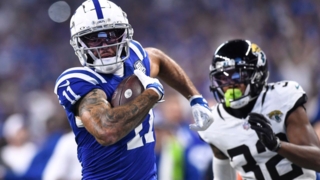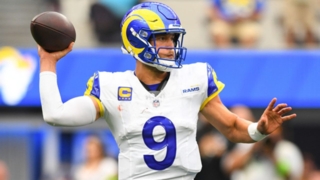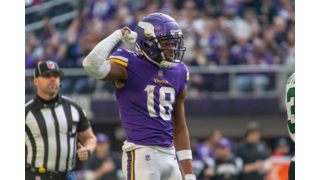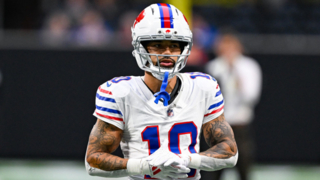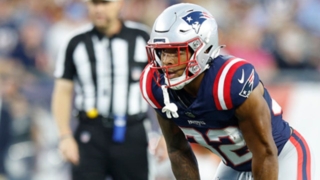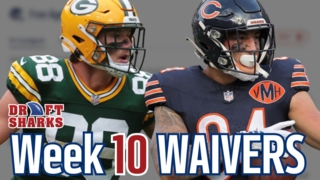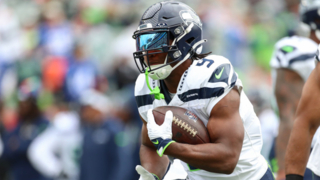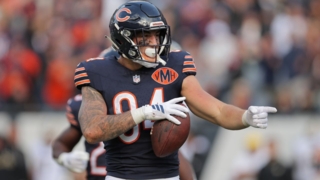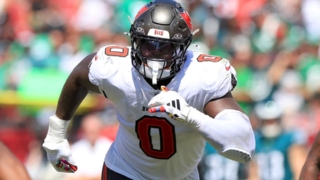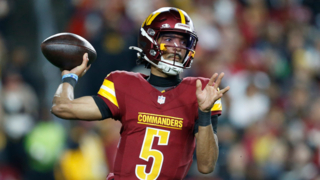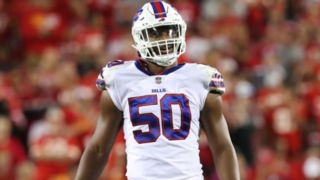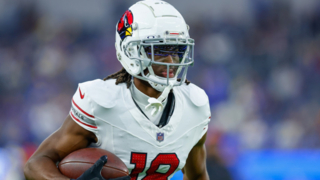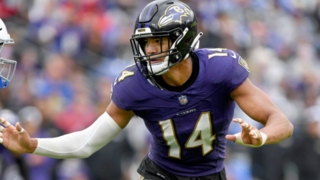The Workhorse Runner Is Back. Here's Why You Should Ignore Him.
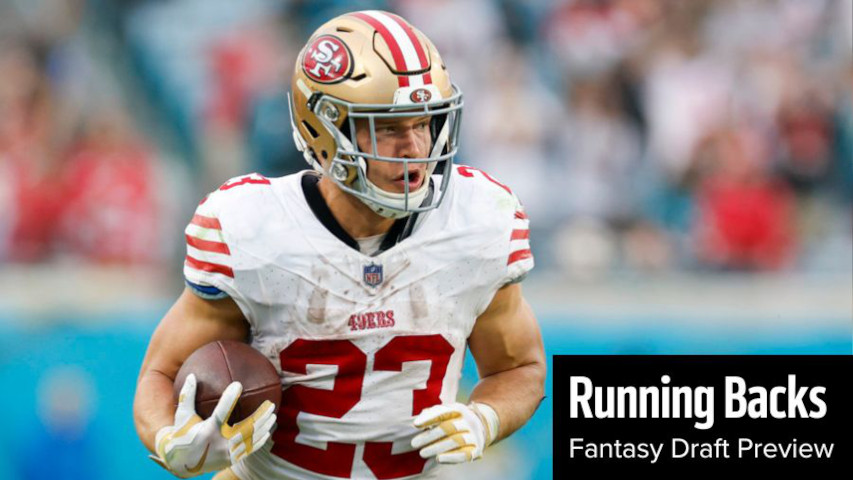
Did Last Season Change the Plan at RB?
2023 marked the first time since 1990 that no RB reached 300 carries.
Last season, six RBs hit 300+:
- Saquon Barkley
- Derrick Henry
- Kyren Williams
- Bijan Robinson
- Jonathan Taylor
- Josh Jacobs
The last time at least six RBs hit that total? 2010.
The five years before 2023 also fell well short:
| Year | 300+ Carry RBs |
| 2022 | 3 |
| 2021 | 2 |
| 2020 | 2 |
| 2019 | 2 |
| 2018 | 1 |
While the rest of your league chases bell-cow rushers, you should remain focused on what matters most in PPR leagues: receiving.
Catches deliver more PPR value than rushing attempts. Let’s dig further into why …
The Numbers Say It All: Receiving Still Wins
The six RBs above finished RB1, RB3, RB4, RB7, and RB17 in PPR leagues.
The RBs that fill in the gaps between them powered their numbers with more receiving. Carries obviously matter for fantasy production, but catches present easier paths to that production.
On average, one rush attempt has equaled 0.65 PPR points over the past five seasons.
A target? Nearly 1.55 PPR points.
Over the same stretch, top-12 RBs averaged 52.3 catches per season. Of course, the elite performers tend to be the guys who mix that receiving with strong rushing volume.
Over the same five-year sample, top-12 RBs have averaged 234.47 carries and 10.33 rushing TDs per season.
Our Projections Love These Pass-Catching RBs
Head to our RB rankings, and you’ll see we have seven RBs projected to hit 52+ catches:
- De’Von Achane
- Alvin Kamara
- Christian McCaffrey
- Bijan Robinson
- Breece Hall
- Jahmyr Gibbs
- Chase Brown
Four of the seven currently sit in the first round, according to consensus ADP.
We are also comfortable with seven of the eight at the current cost, per our ADP Market Index.
Not Sure When to Draft RBs?
Head to the Draft War Room and get a custom cheat sheet for YOUR fantasy league.
Jahmyr Gibbs Could Disappoint
The only outlier among them, Jahmyr Gibbs, faces adversity.
He's down two offensive linemen, with G Kevin Zeitler gone to Tennessee and C Frank Ragnow retired. Both delivered excellent run blocking in 2024. Zeitler ranked fourth among all guards in Pro Football Focus' run-blocking grades; Ragnow third among centers.
Detroit's also near-certain to score fewer points than last year's league-leading mark. The betting markets project the Lions to average 7.8 fewer points per game this year than last.
Plus, there's still a David Montgomery problem. Montgomery sprained a knee in Week 15 and missed the rest of the 2024 regular season. Through Week 14, Gibbs ranked sixth in PPR points per game, and tied for just 20th in expected points per game. That trailed Montgomery, among others.
From Week 15 on, Gibbs jumped to third in expected points per game and led the position in scoring.
The speedy Gibbs should spend most of his career outscoring "expected" rates. That's the type of player he is and why Detroit drafted him in Round 1. But his usage alongside Montgomery must change dramatically to lower the risk on his mid-Round 1 ADP.
Christian McCaffrey's 374-point ceiling projection ranks second among RBs.
Zero-RB Targets That Keep You Competitive Weekly
We prefer to stay flexible throughout a draft over sticking to a specific pre-draft plan. But maybe you want to draft a zero-RB team or simply find the start of your draft pushing you in that direction.
In that case, here are some attractive targets.
The 'Starters'
Zero-RB typically refers to skipping RBs through at least the first six rounds. If you start in Round 7, consider this trio:
- Tyrone Tracy Jr.
- Jaylen Warren
- Brian Robinson Jr.
All three should be startable in fantasy lineups from Week 1, and all three look like decent-to-good bets to lead their backfields in fantasy points.
Warren faces the biggest challenge, with third-round rookie Kaleb Johnson on board. But remember how important receptions are? Warren should at least maintain the receiving lead over Johnson.
TIP
Read more about the upside cases for Tracy and Warren among our RB sleepers.
Build Out the Corps
Of course, part of drafting zero-RB is conceding that you're not likely to land every-week starters on draft day. So you'll want to collect potential starters throughout the late single-digit rounds.
The Jaguars backfield looks fertile for fantasy value, with new HC Liam Coen coming off piloting the Bucs to the league's second-most RB PPR points. Jacksonville presents three options at modest cost:
- Travis Etienne (mid-Round 8 ADP)
- Tank Bigsby (mid-Round 10)
- Bhayshul Tuten (Round 12)
J.K. Dobbins leads Denver's initial RB depth chart, which points to a significant immediate role under another coach (Sean Payton) who has been historically friendly to RB scoring.
Tyjae Spears might face a tougher path to immediate starter value. But he has a shot to deliver that even while sharing the field with Tony Pollard. And a Pollard injury could catapult Spears into season-defining range.
You'll definitely want to stock a zero-RB roster with upside shots like that.
Later-Round Targets
These guys make sense in the double-digit rounds:
- Jerome Ford, Cleveland Browns. He looks like the favorite to lead Cleveland's backfield while Quinshon Judkins tends to his legal case. At his Round 11 ADP, Ford deserves to be starred on your zero-RB draft list.
- Roschon Johnson, Chicago Bears. D'Andre Swift has spent most of his career as an inefficient rusher. The last time he played under Ben Johnson, Jamaal Williams carried a dramatic lead in rushing work and fantasy points. Johnson sports intriguing upside at a low-risk cost.
- Ray Davis and Jaylen Wright. We'll dig further into these guys in a minute.
If you know you'd like to draft a zero-RB team -- or even if you're just toying with the idea -- practice your plan in the Mock Draft Simulator to see how you like the results.
If a Zero-RB strategy feels too risky, you might prefer a Hero-RB strategy.
TIP
Using dynamic player rankings can help you stay flexible. Learn more about the best way to draft.
Hero-RB: Your Path to Drafting Sanity
This path finds you drafting your RB1 in Round 1 or 2 and then waiting several rounds to address the position further.
For this year, you might use a Round 1 pick on Bijan Robinson and then wait until Round 6 to take Isiah Pacheco.
Ultimately, we place value above all else, meaning you must remain flexible in your draft. This method affords more flexibility than Zero-RB to follow your draft’s value.
Double Hero-RB: A Smart Bet on Early Value
The rise of zero-RB and hero-RB approaches can mean fewer RB selections in the first two rounds and thus more early value available at the position.
The Double Hero-RB strategy allows you to fortify RB with a pair of studs before filling out the rest of your lineup. That could mean following your Round 1 Bijan Robinson selection this year with Jonathan Taylor in Round 2.
The idea here is to nail down two every-week starters early. So you’d follow that pair by waiting until much later to grab insurance options at the position (think Round 8 or later).
Follow the Value, Not the Script
Ultimately, your best strategy will be to stay flexible as the draft unfolds.
You could make any of those aforementioned strategies work in your draft. But your best bet will be to stay flexible and follow the value of your specific draft.
What if you’re trying to go hero-RB but the top options start flying off the board ahead of ADP? You’ll want to pivot to WR rather than reaching for a weak RB value to fit a static plan.
Or maybe the opposite occurs. Let’s say you’re planning to lean away from RBs early in your draft … but half your league has the same idea. Are you going to pass on a screaming RB value just so you can stick to your script?
I wouldn’t recommend it.
Want More Prep?
Check out the draft guide that fits your format for tips at every turn, from every draft position. And your Draft War Room is always ready to guide you toward value picks specific to your draft.
As you get to the later rounds, it’ll even switch into Upside Mode to highlight breakout types at RB (and other positions).
These Sneaky Late-Round RBs Could Make Your Year
Finding a late-round RB who blows up can change your team's fortunes.
Think Bucky Irving last year. He opened the year in a committee, but we knew that Week 1 committee leader (Rachaad White) looked fragile.
Fantasy managers often avoid RBs in committees because of the touch uncertainty. But find the guy who combines talent with potential opportunity at a discounted draft price, and you just might find a difference maker.
Handcuff backs also make sense. Target one for …
- his strong offense
- the fragility of the starter in front of him
- or the backup’s sheer talent
… and you’re one injury away from a potential fantasy starter.
Here are a few deeper sleepers we’re drafting:
Ray Davis, Buffalo Bills
Davis has already flashed his handcuff value. With RB James Cook sidelined for Week 6 last season, Davis played 58% of the Bills’ offensive snaps and racked up 97 yards on 20 carries.
He also caught all three of his targets for 55 yards.
Even without a TD, he still ranked 12th among PPR RBs that week.
The Bills also didn’t add any RBs, meaning Davis should step into a significant workload if Cook misses time. And Cook’s “hold in” over his contract squabble certainly doesn’t hurt Davis’ chances of seeing the field.
Davis’ ability to break tackles should also help his chances of seeing the field. His 0.26 missed tackles forced per carry ranked ninth among 47 RBs with 90+ attempts last season.
Davis’ film backs that up. He consistently runs with a low center of gravity and drops his hips on contact, causing defenders to struggle wrapping up. Last year’s Bills produced the fourth-most RB PPR points, fueled mainly by the second-most RB rushing scores (20). If Davis gets a shot at starting due to injury, he could be in-line for top-20 RB weeks.
Target Davis late and be ready if Cook falters.
Jaylen Wright, Miami Dolphins
We highlighted Wright as a dynasty trade target last season, showcasing the skills he flashed as a rookie.
That came after the Dolphins traded their 2025 third-round pick to move up and select Wright in Round 4.
Wright saw limited work in the crowded 2024 backfield. But Raheem Mostert and Jeff Wilson are gone. The new competition? Alexander Mattison and sixth-round rookie Ollie Gordon. That leaves Wright a clear path to run second to De’Von Achane, who’s not built for a workhorse role (11.9 carries per game in 2024).
Back in 2023, we saw Mostert and Achane both finish as top-five PPR RBs in points per game. The offense under HC Mike McDaniel has shown the ability to use two RBs effectively.
We already got a preview of what Wright can do if Achane goes down. When the starter went down with a concussion in Week 5 last season, Wright stepped up with 13 carries for 86 yards. He displayed phenomenal vision between the tackles and burst with good decision-making.
Wright’s 4.38 speed helped supply runs of 16 and 17 yards in that contest. And he earned the second-best PFF rushing grade of the week, behind only Bijan Robinson.
Wright also added muscle and shed body fat this offseason. Heck, even Tyreek Hill commented that Wright should get more touches.
Wright’s 16th-round ADP makes him an easy late-round grab with loads of upside.
Kendre Miller, New Orleans Saints
The Saints drafted Miller as the fourth RB in 2023, ahead of Tyjae Spears, De'Von Achane, Tank Bigsby, Roschon Johnson, and Chase Brown.
That followed a college career in which he delivered 6.7 yards per rush and a solid 29-229-1 career receiving line. His Pro Football Focus run grades improved each year, culminating in a high of 88.5 in Miller's final season.
Unfortunately, injuries have plagued Miller since he entered the league. Last year, he missed 10 total games with multiple hamstring issues, plus a Week 17 concussion.
His rookie season found nine games lost to hamstring and ankle injuries.
Miller said this offseason that he feels the healthiest of his career.
Beat writer Ross Jackson also touted Miller’s fit within HC Kellen Moore’s offense. Jackson is right.
Miller played in a similar inside-zone scheme in college. His vision and shiftiness work well with zone blocking, especially with a focus on inside cutback lanes.
We have seen flashes from Miller, including in the 2023 finale when he ran for 73 yards and a TD on 13 carries, filling in for a resting Alvin Kamara.
The Saints did draft Devin Neal this spring, but not until the sixth round. Plus, Neal has missed most of training camp with a hamstring injury.
The depth chart otherwise features career disappointments such as Clyde Edwards-Helaire and Cam Akers.
The best thing about Miller? He’s cheap. With an ADP currently sitting in the 22nd round of PPR leagues, you can stash Miller at the end of your draft and see what happens.
Dominate Your League with the Perfect Draft Tool
The draft is the most critical part of your fantasy season.
You know you need to draft the right players at the right time -- but how?
Start with the dynamic Draft War Room, where you'll get custom player values for your fantasy league.
Take a few minutes to watch the video below, and you'll learn why this is the most powerful draft tool in the industry:
Draft using the best dynamic tool in the industry. Our fantasy player valuations (3D Values) change during your draft in response to...
- Exact league settings - direct sync
- Opponent and Team Needs
- Positional scarcity & available players
- Ceiling, injury risk, ADP, and more!
You need a dynamic cheat sheet that easily live-syncs with your draft board and adapts throughout your draft using 17 crucial indicators.
Get your Draft War Room Today
 Redraft
Redraft Dynasty
Dynasty Best Ball
Best Ball


